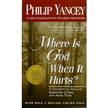


This book was first published in 1977 and again in 1990, and then re-issued again after the September 11, 2001 attack on the twin towers in New York. Many people called Yancey for his take on all this suffering and loss. He realized that he did not have to come up with new answers. They were already contained in this book, so by special agreement with his publisher, the book was special-issued again with a lower price and all the profits to go to the American Red Cross.
I had often heard of the book, and seen it referenced in other works, but didn't get to reading it until this one came into my hands. I see that it is the best edition to get, as Yancey explains how he had to revise and expand some chapters.
It's especially comforting to know that he did a lot of thorough research first.
He found a lot of authors from earlier generations had dealt with this problem of pain, such as Aquinas, Bunyan, Donne, Luther, Calvin and Augustine. But they all accepted pain and suffering as God's agents. Their approach was to justify the ways of God to man.
On the other hand, modern authors on pain bumped God into the position of a defendant, and tried to make God justify Himself to man. When Yancey compared the two heaps of books, he realized that the earlier generations had just as much or more pain to face than the modern ones. They lived in plagues and wrote from filthy prison cells, and dared hope for a life expectancy of 30 years, half of what we can see how.
But with all those texts on pain, the author felt there was room for one more that dealt with the subject on a level that today's average reader can grasp and follow. This is good, because for many people this is the best treatment of the subject they can find, outside of the Bible.
First Yancey checks out the cause and any possible purposes to pain. He finds it to be a gift nobody wants. Referring to other books he wrote with Dr. Paul Brand, a Hanson's Disease (leprosy) specialist, he proves that pain is an alarm system God has given us. If we don't have it, we can lose much more of greater value.
When my Dad heard of a tragic accident, or a series of deaths in quick succession, he would ask people in conversation, "What is God saying to us?" As if somehow God is shouting to us through these tragedies. (Somehow that always has me bristling).
Yancey faces that point head on though, and points out that "Jesus never gave a poor or suffering person a speech about 'accepting your lot in life,' or 'taking the medicine that God has given you.'" (pg.82). Instead, in Luke 13, when He was asked about two local catastrophes, a political situation in which the Roman army killed some members of a religious minority, and a tower under construction that fell on the workers. His answer was no, they were not guilty of anything.
The victims were not being punished for anything. But God can intervene in human tragedies, and display His glory and power.
Yancey also uses some chapters to share the interesting stories of people who have overcome handicaps and servere pain, or turned it into somsething that glorifies God. He compares the different but both valid reactions of Brian Sternberg who was paralyzed in a ten foot fall, and Joni Earckson Tada, who fell in a diving accident as a teenager. One has sought every kind of healing and recovery plan available, and the other accepted her place, and turned her life into one of public ministry to other handicapped people.
He relates some other extreme cases too.
I like the list he found, by a Catholic nun named Monica Hellwig. She had written a list of advantages to being poor, and Yancey expanded and adapted it to include suffering. It is probably too much to quote here, but I think I should make myself a poster of these ten advantages, and keep it handy for my own reference. (pg.145).
The second on coping with pain has helpful information about new frontiers of pain management, but more on dealing with the fears, the sense of hopelessness, and then too, happily, on the meaning and hope in the midst of it all.
The best part (although I like all of this book very much), is the last section called, How Does Faith Help? This is where he points out that Christ is the only Head of a religion that came down to join us and experience our suffering personally. When we look at how much Christ suffered on the cross we realize that He truly does understand what we go through.
But besides knowing that God in Christ Jesus sees and understands our hurts, is the fact that He gave us the Church, where we are to be Christ to one another. We are to help carry one another's pain.
For sure you know others who want to talk about these lessons on pain, and this book makes a good guide. It comes with a discussion guide of questions to ask in a group setting. No additional book to buy.


Ruth Marlene Friesen
The Responsible One
Privacy Promises ~~
Sitemap
Ruthe's Secret Roses (official site)
©2001-2025 Ruth Marlene Friesen
Saskatoon, Saskatchewan, Canada